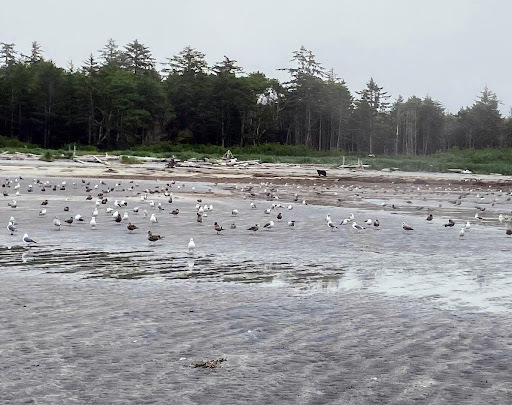-

Superintendent's Corner: Mr Jeremy Tinsley
Here I am
As a boy, Samuel lived, learned, and slept at the temple, under the mentorship of the High Priest, Eli. One night Samuel was awoken by a voice calling out to him. This occurred several times during the night, and each time Samuel got out of bed and went to his teacher, Eli, “Here I am; you called me.” Much like a parent who's been woken from a deep sleep by their child, Eli told him to go back to bed.
After the last occurrence, Eli realized that it was God himself who was speaking to Samuel, and he instructed Samuel to reply, “Speak, Lord, for your servant is listening.” Samuel returned to bed, again heard the voice calling to him, and responded as instructed. God then laid out a vision for his life and for the work God was about to do through Samuel in Israel. The vision frightened Samuel, but Samuel followed. (1st Samuel 3)
Samuel’s heart was open to hearing God speak; although apprehensive and perhaps worried, he responded humbly and with a desire to do God’s work. As a result, Scripture says that all of Israel recognized that Samuel was a prophet of the Lord.
The prophet Isaiah responds similarly. In Isaiah 6:8 we read how Isaiah exclaims to God, “Here I am. Send me!” Was Isaiah aware of the difficult places God was about to send him? In some ways he would become Israel’s conscience, pleading with his country to repent and return to God - a constant bearer of bad news! What an incredibly tough job!
In the Easter story, at the Garden of Gethsemane, we read how in sorrow and anguish Jesus prayed and asked God, “May this cup be taken from me,” which we interpret as Jesus asking if God might find a way forward that didn’t involve Jesus’ imminent torture and death on a cross. Yet Jesus followed this expression of anguish with the words, “Yet not as I will, but as you will.” Jesus was willing to walk forward into the most difficult of circumstances out of love for the Father and love for each of us. (Matthew 26:38-40)
Easter reminds us of the gift Jesus offers each of us - life eternal - when we place our trust and faith in him, and importantly, Easter is a call to follow him. Samuel, Isaiah, and Jesus’ examples further illustrate that when our posture is to follow God, even into places of discomfort, others will know that the Lord is God and our work and lives will be blessed by him.
What places of discomfort do you find yourself facing? So often our natural tendency is to avoid, escape, or run away. Will we follow him, even into those difficult and unknown places?
The act of following God is an act of faithfulness and worship. Whether in our work, our parenting, our recreational activities, or our relationships, may we have the courage to faithfully follow wherever he leads. -
Superintendent's Corner: Mr Jeremy Tinsley
The Heart of Jesus
Many years ago I taught a student in grade 1 who would have loud and dramatic meltdowns that included lying on the floor kicking and screaming, with arms flailing about wildly. This would go on for several minutes, all too frequently.
I sometimes wondered why the student was in my class and why I was the teacher who had to “deal with him” each day. ‘This kid shouldn’t even be here, should he?’ I thought, ‘Look at the stress he is causing me!’ I was frustrated. My response was too me-focused, rather than wondering what was going on in the life of this boy that would cause him to act this way.
I learned that the boy’s English level was very low - English was his second or third language - I eventually learned that his meltdowns were a response to frustration and exasperation. He didn’t want to cause issues in class, but he didn’t know of any other way to communicate. Perhaps there were deeper issues in his life that I didn’t know about.
He and I eventually figured out a system of communication that didn’t rely heavily on spoken language, but rather on body language and a picture of a stop-light that I hung up in the class. My raised eyebrow (learned from my wonderful mother!) and my finger pointing at the “Yellow” light was a warning that he understood and resulted in him quickly correcting potentially problematic behaviour. He and I started to trust one another, the meltdowns steadily reduced, and we both learned from each other.
Helping that student move closer to a place of flourishing was one of the most rewarding (and difficult) moments of my teaching career. He taught me about my own areas for growth, while also causing me to reflect on the attributes of the heart of Jesus.
I believe that Jesus' description of his own heart impacts the question of who we serve at VCS. Christ speaks to his own heart in Matthew 18:28-30.
"Come to me, all you who are weary and heavy laden, and I will give you rest. Take my yoke upon you and learn from me, for I am gentle and lowly in heart, and you will find rest for your souls. For my yoke is easy, and my burden is light.
For I am gentle and lowly in heart."
Dane Ortlund, author of Gentle and Lowly: The Heart of Christ for Sinners and Sufferers, unpacks this passage like this: Christ’s heart is tender, open, welcoming, accommodating, understanding, humble, and willing.
Ortlund says that the Christian life is “inescapably one of toil and labour.” Christ isn’t saying that life will be easy in the way society thinks of the easy life. Rather, through the toils and struggles of life Jesus continually “lives in our place of need,” not just meeting us there, “but living there with us.” We are carried along in life by his “endless gentleness and supremely accessible lowliness.”
The word “easy” in this passage - my yoke is easy - may be better understood as “kindness” as also referenced in Ephesians 4:32 and Romans 2:4. His yoke is a yoke of kindness.
May we be a community that models the heart of Jesus to those we serve, whether flourishing or not yet. The toil of this work is worth it. Jesus did the same for us.
-

Superintendent's Corner: Mr Jeremy Tinsley
VCS Recognizes Orange Shirt Day
A parent who was visiting a Christian school once remarked to me, “This is the first ‘Christian’ building I’ve been in since I left residential school.”
On another occasion, a mother who was participating in a new family admissions meeting said, “After residential school, I was angry and hurt. I fell into bad things. In order to get my child back, I had to learn to let go of the anger.”
The lives of both parents were forever changed by their experiences in Canadian residential schools that were run by the church, with the support of the federal government. One parent experienced significant abuse while at the school, while the other witnessed classmates being harmed. As adults, both are still dealing with complex feelings regarding Christianity, their own indigenous culture, and how to help their children avoid the physical and psychological harm that they could not. They are both strong and resilient people with gentle hearts.
As we recognize the National Day for Truth and Reconciliation in Canada, we as a Christian school community hope deeply that we will never become an obstacle that stands in the way of another person, all who are made in God’s image, from experiencing the love and saving grace of Jesus.
Our staff will recognize this important day in varying, age-appropriate ways, and all students are invited to wear orange, or an orange ribbon, on Thursday, September 29th. We do so not because we are expected to, but as an act of love and respect for our indigenous neighbours.
Jeremy Tinsley
Superintendent -

Superintendent's Corner: Mr Jeremy Tinsley
Dear VCS Families,
Sometimes in life, we have the experience of feeling both fear and awe at the same time. The feeling is both uncomfortable and life-giving. Or perhaps the perception of one’s life possibly being at risk heightens the joy of being alive!
While backpacking in early August in Cape Scott Provincial Park, a remote park on the northern end of Vancouver Island, we encountered a large black bear. The bear was feeding at the end of an expansive, sandy beach near the outflow of a river into the Pacific ocean. Regrettably for us, it was close to a small creek that was our only source of drinking water, which we badly needed after a long day of hiking through thick rainforest.
It was unnerving. To observe and be watched by the two grizzly bears in their enclosure at the top of Grouse Mountain is one thing - they are separated from you by an electric fence. To be watched by a large black bear on a remote beach with nothing but 100 meters of sand separating you from the bear produced feelings of wonder and frankly, I was a bit scared! If the bear chose to charge, there was nothing but my single can of bear spray to protect us.
The bear watched us and we watched it. This was the bear’s territory and it was unlikely to move on. We needed water. We had no choice but to cautiously navigate in front of the bear in order to reach the water that sustains life. We continued walking steadily towards the creek. With great relief, we saw that the bear chose to keep feeding on seafood!

Later, as I reflected with wonder on what we’d seen and experienced, I asked myself if what I felt might have been a slice of what Moses felt when he encountered God on Mount Horeb or in the burning bush. I thought about Proverbs 9:10, “The fear of the Lord is the beginning of wisdom...” Perhaps to fear is also to feel a deep sense of reverence and awe for the majesty of who God is, and the fact that a God so great could care for a person so small and sinful as me.
As we walk the trails that a new school year brings, we are grateful that at Vancouver Christian School we can explore the majesty of who God is in the lives of our children and teens. God is not compartmentalized into Bible lessons or chapel or prayer time, but who He is and His majesty infuse everything we do - every lesson, every subject area, every interaction with others - this is our hope and prayer.
The awe I felt seeing that black bear is nothing compared to the majesty of our God. His power is impossible to understand. We step forward in hope because we know that this great and powerful God holds all things together (Colossians 1:17). Life is beautiful, complex, and often messy, but because of what Jesus did for us on the cross, we have hope. We serve a risen Saviour and an awesome God whose love is vast and deep.
Welcome to the 2022-2023 school year!
-
Superintendent's Corner: Being Made New in Christ
Throughout this school year, I’ve been meeting with VCS parents, grandparents, and supporters of the school. I’ve appreciated and valued these meetings - I’ve had about 30 of them so far. They’ve given me an opportunity to get to know you and listen to what you love about VCS, as well as hear your input regarding our rooftop project and VCS in general. I wish I was able to meet with more families at a faster pace!
Recently, I met with a parent of two children who recognizes that we are a diverse community and will not always be uniform in our understandings of Scripture. However, she so loves that VCS teachers desire to be in relationship with students and pray for them. She talked about how the staff get to know her kids and show real, true care for them.
2 Corinthians 5:14 & 17 reads:
For Christ’s love compels us, because we are convinced that one died for all, and
therefore all died…Therefore, if anyone is in Christ, the new creation has come:
The old has gone, the new is here!I also find The Message translation of this passage helpful:
"Because of this decision we don’t evaluate people by what they have or how they
look….Now we look inside, and what we see is that anyone united with the Messiah
gets a fresh start, is created new. The old life is gone; a new life emerges! Look at
it! All this comes from the God who settled the relationship between us and him,
and then called us to settle our relationships with each other."
In Genesis 1:26-27 we learn that all people are made in the image of God. As image-bearers, all people ought to be treated with respect, dignity, and care. God desires to be in relationship with each of us and to see us follow Him.In the New Testament, Jesus encounters Pharisees who attempt to trap him by asking Jesus which of the laws was the most important. Jesus replied, in summary: Love God, love others; all the law hangs on these two commands. (Mathew 22:37)
Jesus calls us to love and respect others, our neighbours. That sounds straightforward but as we all know, it’s not. Life is complex and messy. Kids are complex and sometimes do surprising things. Sin impacts everything and every relationship. We need Jesus and lots of forgiveness too!
As we raise our children and work with our students, how do we help them understand that we love and care for them even as we guide them in ways they may not like or understand? It’s hard.
What’s clear to us is that Jesus invites us into a relationship with Him and each other. As Christian educators, we are taught that relationships are extremely important.
Jesus consistently challenged the legalism of the religious leaders, who valued the law, rules, and traditions above relationships. Need healing, but it was the Sabbath? Jesus chose to heal, rather than follow the strict Sabbath rules, even under threat of death (Mark 3:1-6).
When we focus on relationships we can still guide, correct, and help students learn accountability. It’s not one or the other. To be focused on relationships doesn’t mean we’re soft pushovers.
It’s easy to get frustrated or down when it seems that our investment in relationships with our children or students isn’t paying dividends, isn’t producing fruit.
A pastor reminded me that the process of being made new in Christ often happens gradually. That’s so true. And that’s why we try to take the long view when working with our kids. We may not see much growth from week to week, but if we believe and trust that the Spirit is present and working on their hearts, we can have hope that through our relationships God is at work.Even as Jesus continually works on our own hearts, as we ourselves are slowly transformed, we are less likely to see people for who they are not, and rather see them for the image-bearers that they are.
Following Jesus means we’ll continue this hard, redemptive work in a fallen world, of loving others, of building relationships.
Let’s be encouraged by the vision cast in Revelations 7:9. One day we will be at the foot of Jesus, worshipping him with people from every nation, every tribe, every language. Through the work of the Holy Spirit, transformation is a living reality. That’s reason to give thanks!